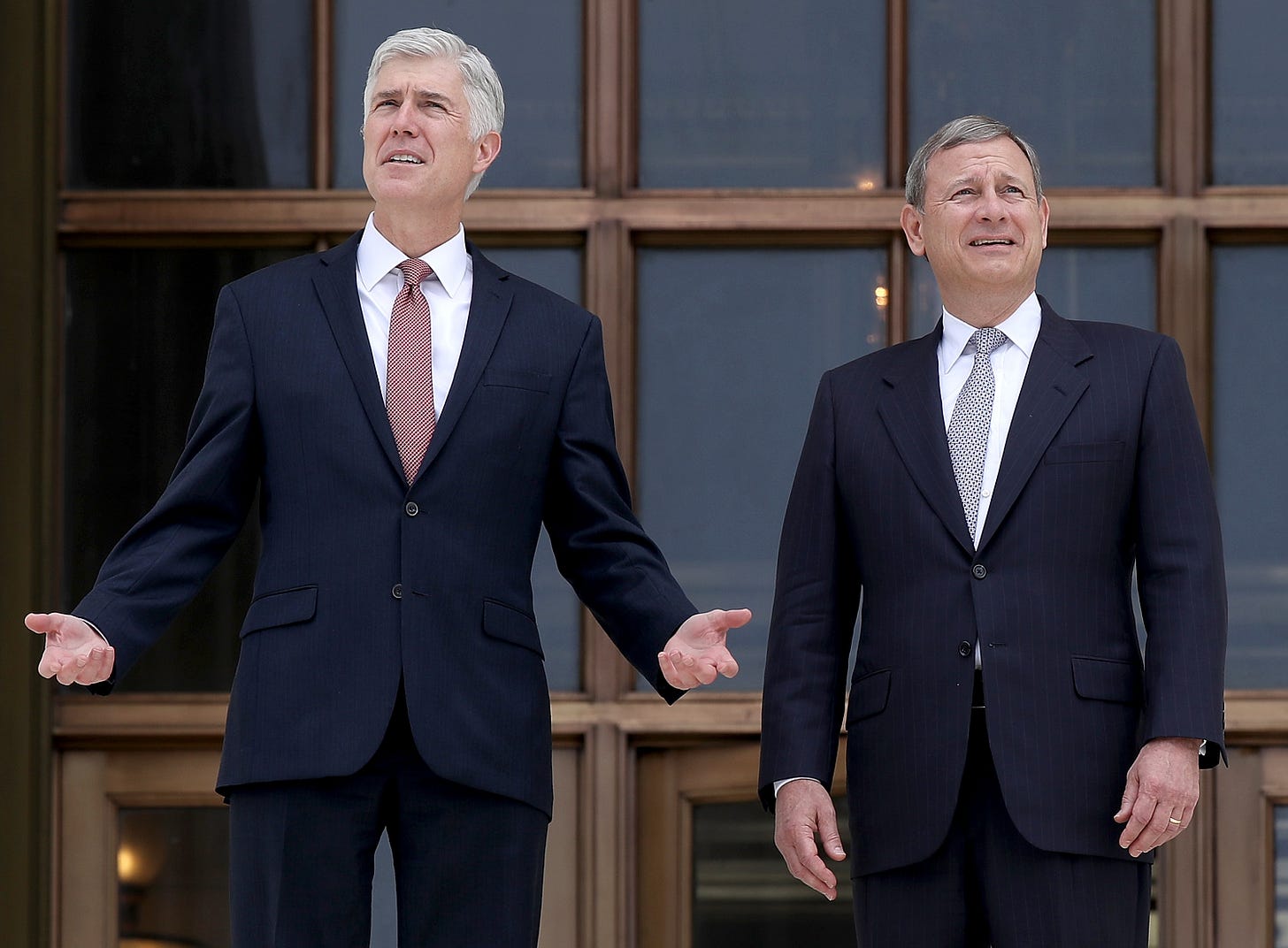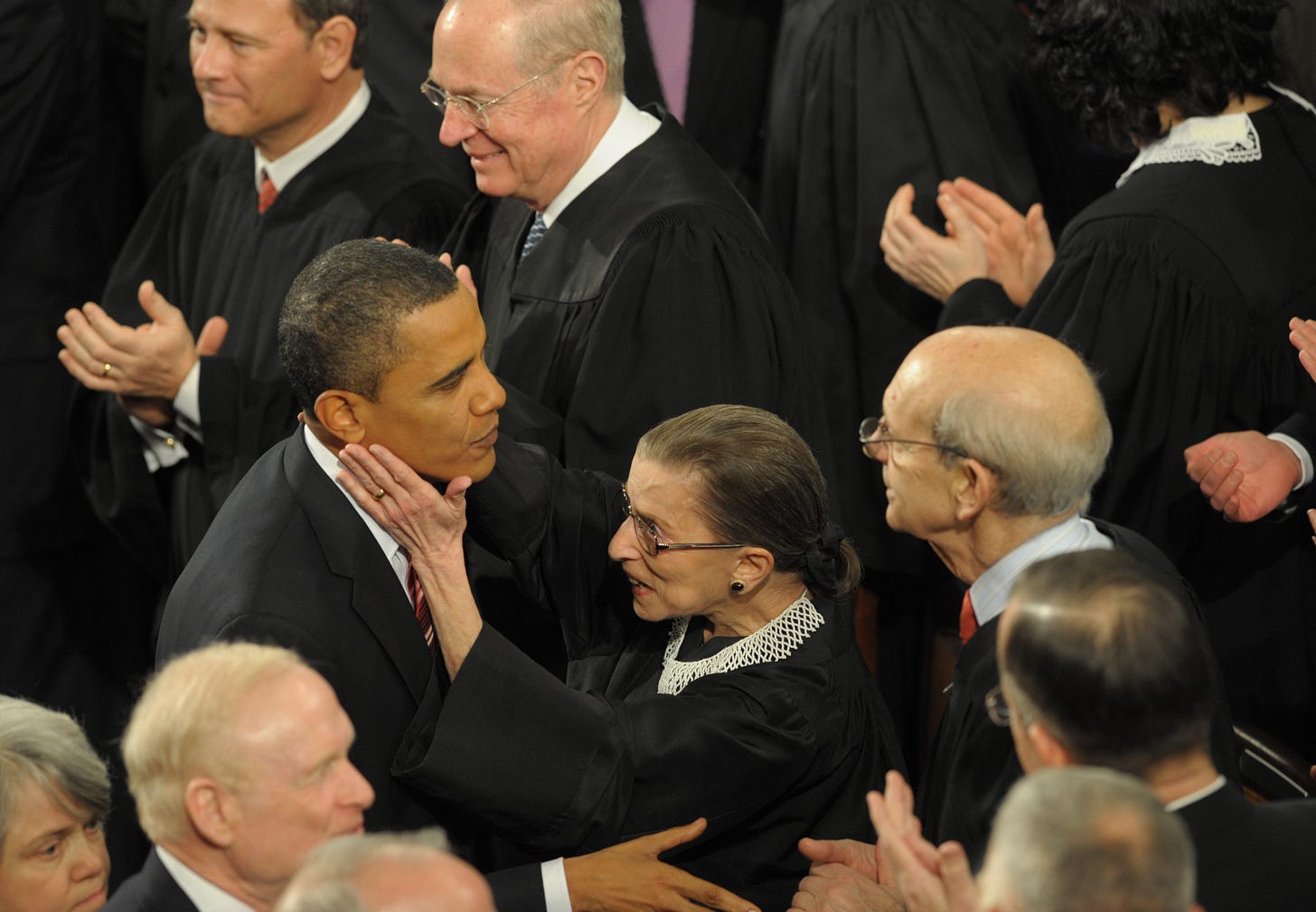The Constitution Is Not As Complicated As Originalists Want You to Think
Originalism is conservative policymaking masquerading as legal analysis. Even if it weren’t, it would still be a hilariously dumb way to run a country.
Editor’s Note: This week, we are working with our friends at Slate to talk about originalism: what it is, why it’s terrible and stupid, and what can be done about it before Republican judges use it to bury democracy under a mountain of half-baked Wikipedia citations.
As a branding exercise, originalism has been a wild success. The concept, once fodder for obscure law review articles no one read, went mainstream in the 1980s, after the Supreme Court dealt the conservative legal movement a series of high-profile losses on issues like affirmative action and abortion rights. In 1985 Edwin Meese III, then the attorney general under President Ronald Reagan, outlined his grand vision of a “jurisprudence of original intention” in a speech before the American Bar Association. “Those who framed the Constitution chose their words carefully,” he said. “The language they chose meant something. It is incumbent upon the court to determine what that meaning was.”
The idea quickly captured hearts and minds on the right by appealing at once to their obedience to authority, their distaste for the Warren court’s “activist” pro–civil rights decisions, and their nostalgia for bygone eras during which, coincidentally, civil rights did not really exist for people who were not white men. Today a loudly professed passion for originalism is table stakes for any ambitious conservative lawyer who hopes to warm a seat on the bench, and among members of the court’s six-justice conservative supermajority, it is basically the only acceptable method to divine the Constitution’s meaning.

Perhaps the most consistent features of originalist decisions are their density and verbosity: To determine whether a purported right is sufficiently “deeply rooted” in “history and tradition,” justices and judges conduct meandering surveys of English common law, quote the dusty treatises of mononymic philosophers, and parse the hastily scribbled notes of founding-era legislators who wrote the letter S, for some godforsaken reason, as F. The majority opinion in Dobbs v. Jackson Women’s Health Organization, in which the court voted to take away a fundamental right it had recognized five decades earlier, spans 79 pages, not including two appendixes of state-level antichoice laws. New York State Rifle & Pistol Association v. Bruen, in which the court invented an individual right to gun possession some two centuries after the Second Amendment’s passage, includes lengthy analyses of the 1328 Statute of Northampton, the roots of King Henry VIII’s skepticism of 16th-century handguns, and the relevance (?) to modern gun safety laws of the “launcegay,” a Chaucer-era weaponakin to a 10-to-12-foot lance.
As a result, originalism’s ascendance has made the Constitution feel even less accessible than it was before, which was “not very.” Supreme Court opinions are famously laden with intimidating jargon, inscrutable shorthand, and italicized case names, all deployed in an effort to decipher a 250-year-old collection of aspirational vagaries and morally repugnant compromises. Understanding the Constitution now also requires familiarity with, to take an example from Dobbs, 19th-century translations of 13th-century treatises that were originally written in Latin. By design, originalism makes normal people—by which I mean those who had the good sense not to blow a quarter of a million dollars on law school—feel like insecure, conspicuous interlopers in a conversation that is plainly Not for Them.
This gatekeeping effect is, I think, the most pernicious lie of originalism because treating constitutional interpretation as the sole domain of judges running haphazard Wikipedia searches cuts everyone else out of the process. This is wrong. The Constitution was written not to be understood by think-tank gremlins writing dueling amicus briefs, or Supreme Court justices with the unreviewable authority to cherry-pick their preferred narrative. The Constitution was written for the people whose rights its language protects and who suffer the consequences if a judge decides otherwise. You simply do not need a medieval studies Ph.D. to be able to read what the law says and form a valid opinion about what it means. And you are not wrong to be skeptical of unelected, unaccountable judges who insist that the record, thin and ambiguous and contradictory though it may be, nonetheless compels but one objectively correct result.
Read the rest at Slate.
As always, you can find everything we publish at ballsandstrikes.org, or follow us on Twitter at @ballsstrikes, or get in touch by emailing contact@ballsandstrikes.org. Thanks for reading.
This Week In Balls & Strikes
13 Trump Judges, Who Are Also Giant Babies, Announce Embarrassing Columbia Boycott, Madiba Dennie
Noted cancel culture opponent James Ho is trying to do a cancel culture again.
Throw Originalism Out. It’s Time For Inclusive Constitutionalism, Madiba Dennie
If not originalism, what instead? Here’s one idea.
Anti-Choice Activists Are Threatening to Sue Women Over Legal Abortions Now, Madiba Dennie
The same lawyers who swore that overturning Roe was about states’ rights are now pushing aggressive interpretations of the law to make women afraid.
This Week In Other Stuff We Appreciated
The Supreme Court Rules That Cops Can Steal Your Stuff—As They Always Have, Elie Mystal, The Nation
Does the Constitution mean anything? Not when armed state agents feel like getting rich!
Supreme Court Should Treat Homeless People With Dignity. Rule Against Grants Pass, William Barber, USA Today
By prohibiting sleeping with so much as a blanket in any public space, Grants Pass, Oregon, effectively makes it illegal to be alive and without a home.
How Originalism Ate the Law, Slate
A deep dive on the conservative legal movement’s favorite fantasy, and what the left can do to stuff it in the garbage where it belongs.





I've seen many pejorative descriptions of originalism, but never one as succinct and accurate as "hilariously dumb." It's definitely time for those of us wishing to understand the current SCOTUS majority to shed the totally undeserved reverence for the Court that has hidden its true nature ever since the era of John Marshall.
I am an originalist. The “history and tradition,” eligible for consideration starts on June 21, 1788.
The Constitution, Article VI, Clause 2 establishes that the Constitution, federal laws made pursuant to it, and treaties made under its authority, constitute the “supreme Law of the Land”, and take priority over conflicting state laws.
The Constitution is a specification. For example, the militia and the second amendment..
Article 1, Section 8
Clause 15,. The Congress shall have Power * * * To provide for calling forth the Militia to execute the Laws of the Union, suppress Insurrections and repel Invasions.
Clause 16, The Congress shall have Power * * * To provide for organizing, arming, and disciplining, the Militia, and for governing such Part of them as may be employed in the Service of the United States, reserving to the States respectively, the Appointment of the Officers, and the Authority of training the Militia according to the discipline prescribed by Congress.
Section 10, Clause 3, No State shall, without the Consent of Congress, lay any Duty of Tonnage, keep Troops, or Ships of War in time of Peace, No consent = no state troops = no state militia.
Article II, Section 2,
The President shall be Commander in Chief of the Army and Navy of the United States, and of the Militia of the several States, when called into the actual Service of the United States.
2nd Amendment:
Only Congress can provide for calling out and organizing the militia. The Militia and “The right of the people to keep and bear arms . . .” are unrelated. They do not depend on each other.
December 15, 1791 .Second Amendment, "A well regulated Militia, being necessary to the security of a free State " does not provide consent, power, or authority for states to keep troops or form militias.
"the right of the people to keep and bear Arms, shall not be infringed." does not grant a Right; it prohibits the government from infringing on the right of the people to keep and bear arms.
Many people conflate the 2nd Amendment (1791) with the Militia Acts of 1792:
Militia Acts
“history and tradition” may provide guidance and earlier Militias may provide a template. However, the Militia was/is what Congress legislates.
Congress passed Militia Acts, (See Article I, Section 8, Clauses 15 and 16 above)
May 2, 1792 act provided to the President, the authority to call out the militia.
May 8, 1792 act provided for organizing the militia, now called the National Guard,
- provided consent for states to keep troops.
- required conscripts to provide their own weapons and accouterments (no 2nd Amendment needed)